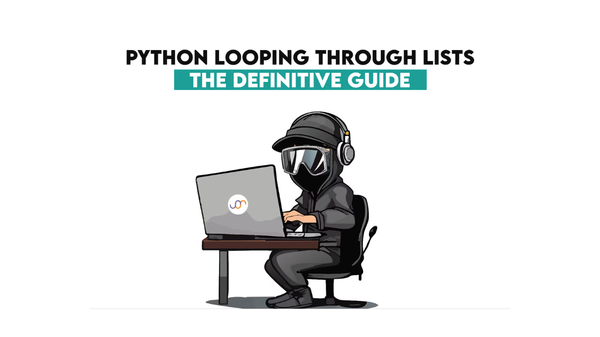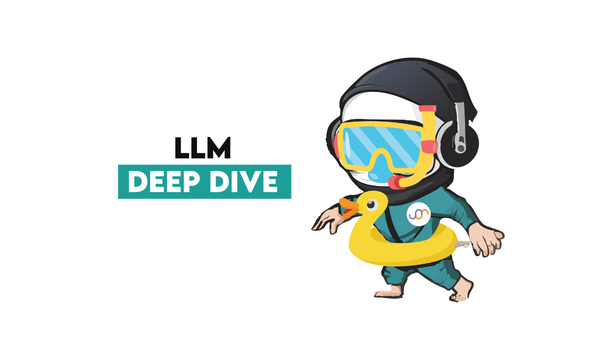Google Data Scientist Position Guide

 Written by:
Written by:Nathan Rosidi
Find out what it means to be a data scientist at Google!
Google is a multinational technology company founded in 1998 to provide Internet-related services and products. It is part of the so-called FAANG companies (or the Big Five American IT companies), including Facebook, Amazon, Apple, and Netflix. Google’s most famous (and core) product is the search engine, with almost 90% (as of June 2021) of worldwide online searches going through Google Search. Google has more than 271 products that, besides the search engine, make the company part of the cloud computing, hardware, software, and online advertising industry. Some of the most famous products include Gmail, Google Maps, Google Drive, Google Chrome, YouTube, Android OS, Google Analytics, Google Cloud. As of 2021, the company employs almost 140,000 people boasting $182.53 billion in revenue for the fiscal year of 2020.
Today, Google Search processes over 3.5 billion searches per day and 1.2 trillion searches per year, positioning Google at the center of data exchange. Considering more than 80% of Google’s revenue comes from advertising services, it’s obvious the main driver of the company’s revenue is data used to connect the businesses with its (potential) customers.
At the time of writing this company profile, there were 1132 job openings only in the data science field at Google and its daughter companies. You can find more information about the openings at Google on their Careers page.
Salaries
Below’s a quick overview of the types of data positions at Google and required experience, with their respective salaries, compared to the national average.

The above table shows that Google base salaries are well above the US national average. Not only that, they are also closer to the upper limit than average.
Along with cash and stock bonus, working at Google gives you many other benefits.These include, but are not limited to, health, dental, disability, and life insurance, 401k, student loan repayment plan, 15 days PTO (increased to 20 days in year 4-5, and 25 days beyond that), and unlimited sick time. Check out our post Google Data Scientist Salary for all the details about earning your salary as a data scientist at Google.
There are also some benefits unique to Google, such as baby bonding bucks, on-site massage, fertility assistance, and travel insurance.
In total, the estimated value of all those benefits is 17k.
Below are the examples of the minimum qualifications required for the three types of data positions mentioned in the table:
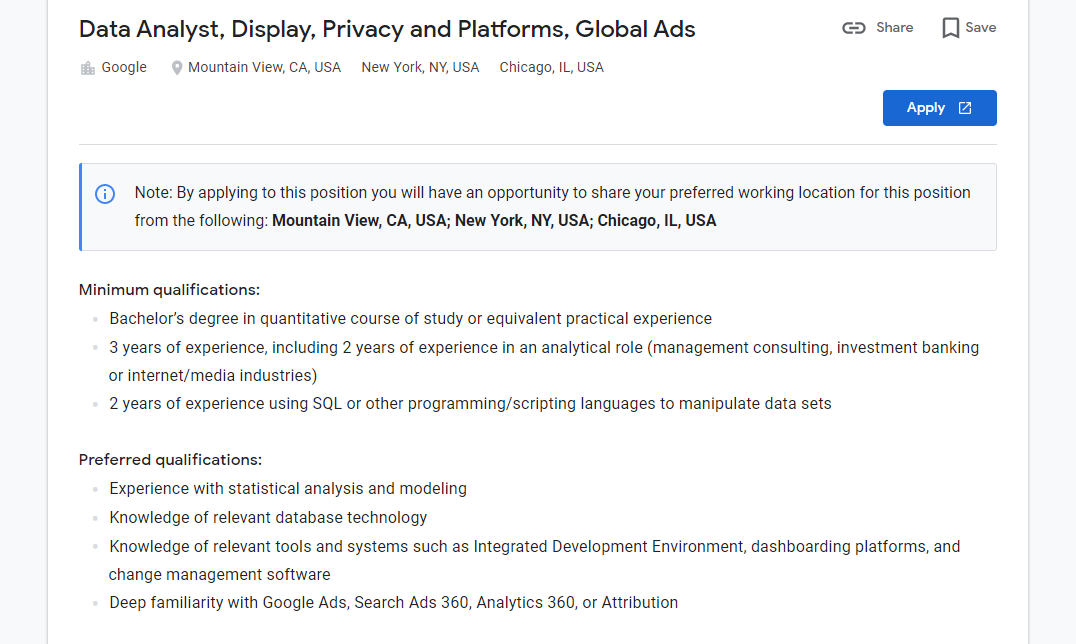

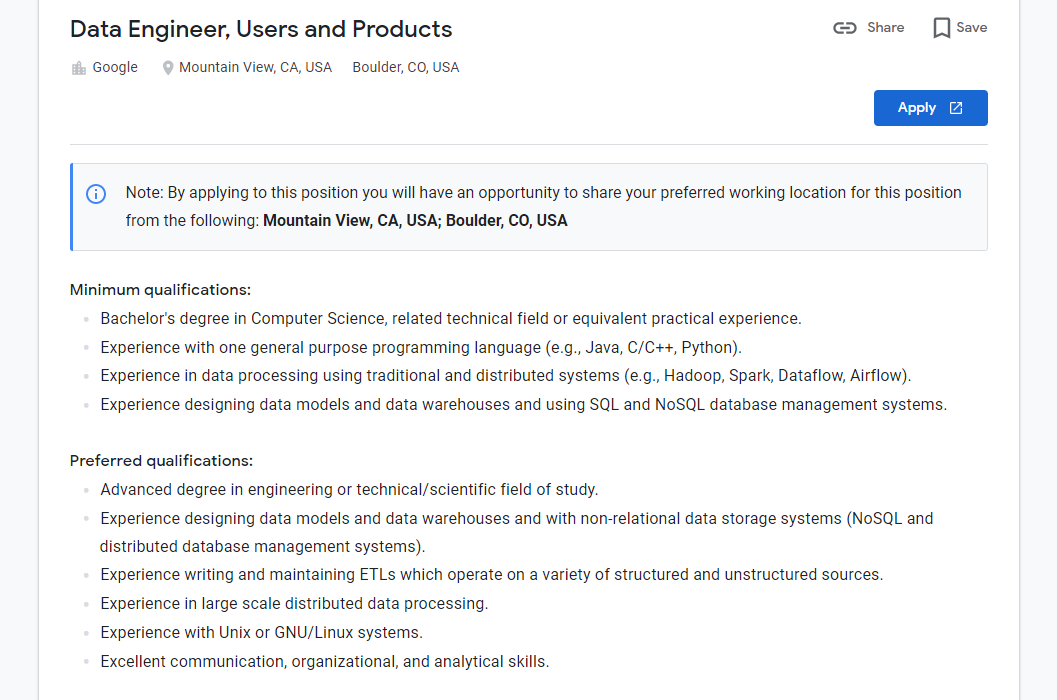
If you take a look at those images above, you’ll notice Google doesn’t look for some generic data analyst, data scientist, or data engineer. Due to the size of the company and the number of its products, there can always be some specifics required for a particular position. For example, working with cloud technologies, legal & compliance experience, financial knowledge, reporting, BI, etc. So the specific requirements really can change with every job ad and with the seniority. For example, for a senior data analyst, it could be much more important how he or she manages the team, communicates with stakeholders, etc.
In the table below, there’s a summary of the most common required experience by role. However, you should always carefully read a job ad to see if it fits you.
Roles and Required Experience
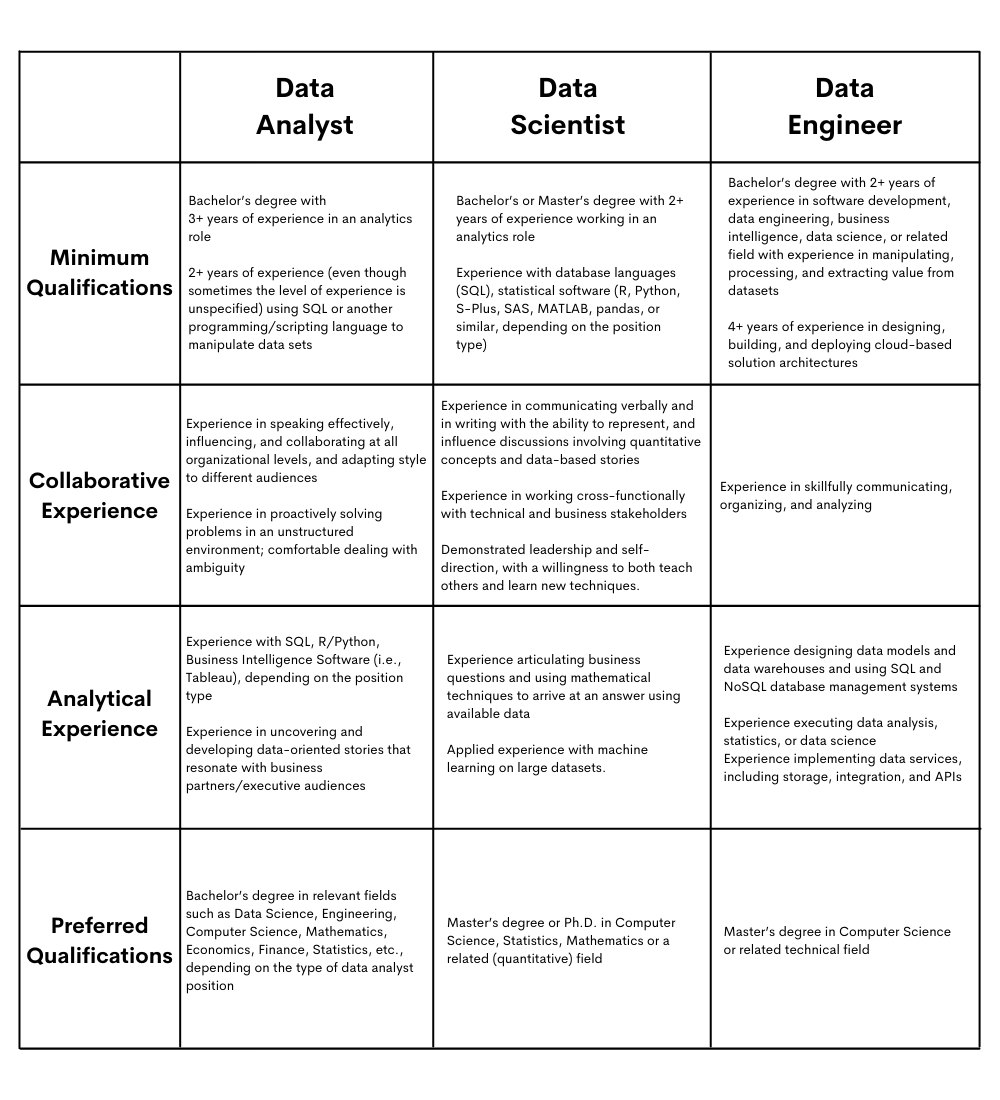
Types of Data Positions
With Google being an engineering company and data being the main input and the main output of Google products, it’s no surprise data scientists and analysts are vital members of almost every team at Google. These data positions range from financial and operation analysts to positions focused on products, marketing, clients, cloud technologies, or compliance issues. Almost every data job description is at least a little different from all others. What your specific job description and requirements are will vary on the team you’ll work in.
These teams include:
Engineering & Technology
In this team, you can find most of Google’s data positions. Engineering & Technology Team is dedicated to engineering, creating, and iterating Google’s products and tools. After all, Google is an engineering company, and by working in this team, you will be at the center of Google��’s core business.
By working in the Engineering & Technology Team, depending on your data position, you will:
- Use large datasets and apply analytical techniques to solve analysis problems. Provide analyses that include data gathering and processing, analysis, and presentation of the insigts.
- Recommend solutions to business problems by presenting your findings to the stakeholders on multiple levels using attractive visualizations.
- Use statistical analysis and modeling to contribute to a wide variety of research projects.
- Use the explanatory, predictive, and prescriptive data analytics and models, which includes knowledge on frequentist statistics, Bayesian statistics, time-series analysis, supervised and unsupervised machine learning methods, natural language process, and semantic analysis.
Sales, Service & Support
This team’s account managers, consultants, admins, and analysts are dedicated to delivering top-notch client service. Sales, Service & Support’s purpose is to negotiate with companies, solve technical challenges for small businesses, and surface client’s product ads in the right place and right time.
As an analyst in this team, your task will be to:
- Collaborate with cross-functional groups such as Engineering, Product, and Legal on initiatives to increase automation, develop front-end tools, update policies, fix product loopholes, and provide a better experience for advertisers.
- Analyze available data and develop automated reports and dashboards.
- Create the analysis that will have the positive impact on business.
Marketing & Communications
You can also find data positions in the Marketing & Communications team. This team’s purpose is to define how people interact with technology and shape the perception of Google. It does that by planning events, designing Google sites, pitching journalists, developing brand materials.
As an analyst in this team, some of your tasks will include:
- Support Marketing & Communications Team by modeling financial impact of the team’s strategies, providing them with insights on user and market trends, opportunities and risks, and required data analysis.
- Report on business goals realization (i.e., acquisition and retention of customers), trends, and provide the business recommendations.
- Use available tools and data infrastructure, as well as improve them, to monitor the budget and its spending effectiveness on differnt levels.
Business Strategy
If you’re looking for a data job in this team, you should know Marketing & Communications are identifying acquisitions and investments, monetizing strategies for products, and developing partners in emerging markets.
To help your team do that, on your data job, you’ll have to:
- Use the business intelligence techniques to model data, develop metrics and reports, create data prototypes, and analyse data.
Finance
Yet another team that requires the experience and knowledge in working with data. This team is dedicated to forecasting, accounting, compliance, and project management.
As a part of this team, you’ll use data to:
- Contribute to the decision-making by providing analytical insights that show business and market trends, together with their underlying drivers. You’ll also work on quantifying risks, analyzing the efficiency of the resources use, and propose improvements.
- Create financial forecasts and support decision-making through analysis. You’ll do that by generating internal reports and monitoring key performance indicators.
People
People Team is something that in most companies will be Human Resources (HR). That means this team hires employees, designs programs for employees’ learning and development, does administrative work, etc.
If you wish to work in this team, you’ll use your data expertise to:
- Use data analysis to support the people team process and systems. You’ll also have to identify impacts of the system’s deficiencies, functional changes, etc.
- Provide reporting and data analysis.
Outlining the Interview Process
Google’s interview process is very thorough and includes several types/levels of assessment. However, they can differ depending on the position you apply for. Meaning, it’s not necessary that all those types of assessments apply for your job. You probably know that Google’s interview process got famous due to the brainteasers they ask the candidates. You can relax; brain teasers are long gone. Google doesn’t ask them anymore because the brainteasers didn’t show to be a good predictor of how well someone would do on the job.
If you enter Google’s hiring process, you could expect the following.
Online Assessment
After you’ve submitted your resume and a Staffing team member thinks you might be a good fit for a job, you may be asked to do an online assessment. For example, answering a coding quiz or something similar. It typically involves two questions with 90 minutes to answer. After you’ve passed it, the virtual will usually be the next step.
Short Virtual Chat
Typically, this refers to one or two shorter conversations over the phone or video. The purpose is to assess the key skills for the role. Usually, the first chat will be with a recruiter. The second conversation will be with the hiring manager or peer on the team.
These short chats will last between 30 and 60 minutes. In the first chat, the interviewer will walk you through the interview process and the role you applied to. In the second call, you’ll most probably be asked to solve some basic coding, data structure, and algorithm problems.
Project Work
Before the in-depth interviews, you could be asked to complete a small project. Such a project could be a case study or providing writing or code samples. The purpose of such a project is to test your way of thinking and how you approach problems. You’ll usually be given a week to hand in your project.
In-depth interviews
These interviews can be over video or in person. They typically include 3-4 interviews in one day, sometimes even more. Expect to spend an entire day at a Google office because every interview lasts 45 minutes. It’s not only interviews; you’ll have coffee breaks, tours around the office, and lunch. Some of these interviews are panel interviews, and some are one-on-one interviews. According to the Google website, you should expect structured interviewing and/or open-ended questions. Structured interviewing means assessing every candidate using clear rubrics, so everyone is evaluated from the same perspectives. Open-ended questions are there to show how your mind works and how you solve problems.
To be more specific, this is usually the technical-knowledge-only part of the interview process. This is the part when you’ll have to really shine, and apart from an in-depth discussion about projects and technical concepts, you’ll also be asked to code on a whiteboard in front of your interviewer(s).
Note: the interview format may vary for the duration of the pandemic.
Types of Questions
Google’s interview questions can generally be sorted into four categories:
- Behavioral Questions
- Product Sense & Business Cases
- Data Analysis & Coding
- Modeling Techniques
Below are some real examples of each category, along with some links to the answers and discussion pages.
Behavioral Questions
These are the questions that typically ask about your background and experience. They also try to put you in a hypothetical situation when you have to answer how you would feel and react. These questions are variations of “Tell me what did you do?” and “Tell me what would you do?”. To be more specific, here are some examples:
- What is your 5-year professional plan?
- Describe a time you failed to reach a goal.
- Describe how you work effectively with others and achieve the desired result.
- Tell me about a project you’re proud of.
The point of these questions is to tell your story. Even though you can’t (and shouldn’t) have all the answers ready to recite by heart, you can learn how to approach these questions, and our article will help you with that.
Product Sense & Business Cases
These questions are designed to test your interest and knowledge in Google and its products. Besides that, they also test your thinking on questions that don’t necessarily require a correct answer, even if they have it.
- What kind of spam will you have on YouTube, and how to deal with them?
- How would you explain cloud computing to a 6-year-old?
- How many cans of blue paint were sold in the United States last year?
Data Analysis & Coding
You’ll have to showcase your data handling, data analyzing, and code writing abilities when answering these questions. In short, they require technical knowledge. Some of the question examples are:
- Find the number of emails received by each user under each built-in email label. The email labels are: 'Promotion', 'Social', and 'Shopping'. Output the user along with the number of promotion, social, and shopping mails count.
- Find the total AdWords earnings for each business type. Output the business types along with the total earnings.
- Write a code to generate random normal distribution and plot it.
Modeling Techniques
The modeling questions refer to questions that test your knowledge of some statistical and/or mathematical concepts required to build a model. Some of the questions you could expect at Google are:
- Why use feature selection? If two predictors are highly correlated, what is the effect on the coefficients in the logistic regression? What are the confidence intervals of the coefficients?
- For sample size n, the margin of error is 3. How many more samples do we need to make the margin of error to 0.3?
Quick Tips
- Do your research about Google, the role, and the interview process.
- If you’re applying for some product-specific position, make sure to know as much about the product itself.
- Self-reflect on your skills, interests, and passions; think about what drives you (in your career and life in general).
- Don’t fake your answers; answer them honestly without guessing what the interviewer wants to hear.
- Think out loud when solving the coding process. That way, you lead the interviewer through the solution and show you’re open to hints, which the interviewers very often provide.
- Work on your technical or non-technical; assess the holes in your knowledge and/or experience and try to patch them.
- Don’t despair; even if you don’t get the job, you’ll gain the interview experience which can help you to get your next job.
Additional Resources
Check our guide to becoming a data scientist at Google and interview guide. Check Google’s site itself; it provides information about the teams and the hiring process. We also have plenty of data science interview questions to go through and make sure you’re ready for the interview. Search for other people’s experience with the company and interview questions. You can find that on Glassdoor, along with the salary for a certain position. Levels.fyi also has up-to-date information on data science salaries and benefits.
Share

